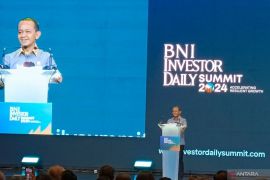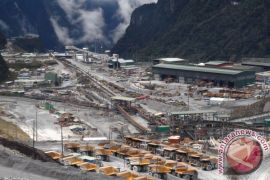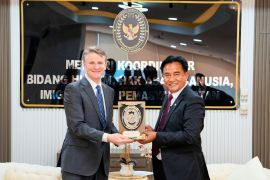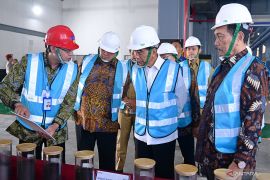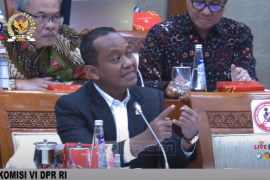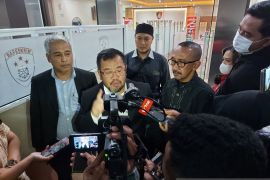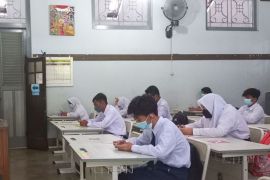Through the newly introduced Government Regulation (PP) No. 1 of 2017, mining companies were urged to change their contract of work status to a special mining license (IUPK) to allow them to export raw minerals.Jakarta (ANTARA News) - Indonesia has, for years, borne witness to the disadvantageous exploitation of its rich mineral resources, losing added values as mining companies simply tapped them and exported mineral ores in raw material form.
Virtually, the government had contemplated on stopping the export of raw minerals about a decade ago, but it could not do it all at once, as mining companies need time to build smelters to process and extract minerals before exporting it.
Hence, the government gave mining companies a deadline until January 2014 to prepare smelters after which raw mineral exports would be banned. However, by January 2014, the government again pushed back the export ban to January 2017.
This time around, mining companies are yet not ready with their smelters. It seems the government has once again relaxed the countrys mineral ore exports as it had done in January 2014.
Through the newly introduced Government Regulation (PP) No. 1 of 2017, mining companies were urged to change their contract of work status to a special mining license (IUPK) to allow them to export raw minerals.
Moreover, the government is in the process of issuing a regulation on the exit tax rate for the exportation of raw minerals. These two steps, the IUPK and plan to issue a regulation on export tax, indicated the governments decision to grant more time for the export of raw minerals.
The government will once again give a five-year time period to miners to complete the development of their smelters. It has currently issued an ultimatum to companies that have yet to build smelters.
Energy and Mineral Resources (ESDM) Minister Ignasius Jonan affirmed that he will revoke the concentrate export permits of companies that delayed the construction of their smelters.
"They have to build smelters if they want to export concentrates. They have to at least promise to build the smelters in five years, with a stamped statement, or else I will revoke their permits," Jonan stated at the ESDM ministry building in Jakarta on Thursday (January 12).
According to the minister, if in the span of five years, the construction of the smelters is not yet completed, the government will not extend their concentrate export licenses.
This is the second time the government has provided export relaxation. Hence, the government is urged to cancel its latest policies.
The Economic Democracy Studies Center of the Gajah Mada University has urged the government to cancel its policy on the relaxation of raw mineral exports, including concentrates, for a five-year period, effective from January 2017.
Researcher of the Center for Economic Democracy Fahmy Radhi stated on Wednesday that Law No. 4 of 2009 on Mineral and Coal Mining clearly prohibits the exports of minerals in the form of ores and concentrates since 2014.
The law required mining companies holding a contract of work to carry out ore processing and purification activities, starting 2014.
"Thus, the relaxation on concentrate exports has violated the law," he stated.
In addition to the violation of Law No. 4 of 2009, Indonesias mineral resources have, over the past seven decades, not been managed optimally through processing and extraction in the country.
"Mineral deposits in the country have been exploited on a large-scale basis and exported in raw mineral form. The added value of mineral exports enjoyed by the nation is low, while mining companies earned multiple profits," he remarked.
To this end, Radhi has urged to review Government Regulation No. 1 of 2017 on Mining Operations and Energy and Mineral Resources Ministers Regulation No. 5 of 2017.
"Go back to applying Law 4 of 2009 that prohibits the export of raw minerals, including concentrates. All minerals must be processed and purified by smelters in the country," he remarked. Radhi has also urged the government to not allow the change in the contract of work status of PT Freeport Indonesia to a special mining license (IUPK).
"If Freeport Indonesias contract of work is changed to an IUPK, it will certainly secure a 10-year extension twice, or for 20 years, which means it will be able to operate until 2041. Thus, the efforts to take over Freeport, whose contract of work will expire in 2021, will never be realized," he stated.
In the meantime, the government, through the Finance Ministry, will soon issue a regulation on taxes on concentrate exports. "The old tax system, which is based on the progress of the smelters development, will likely be readopted," Suahasil Nazara, head of the fiscal policy affairs of the Finance Ministry, stated.
The finance ministrys official made the remarks during the launch of the Indonesia Economic Quarterly reports of the World Bank at the auditorium of the Center for Strategic and International Studies in Jakarta on Tuesday.
In the old regulation, the amount of exit fees for concentrate exports was fixed in accordance with the construction progress of the exporters smelters. "It is likely that we will continue the scheme," Nazara noted.
The Ministry of Finance will discuss the tariff level with the Ministry of Energy and Mineral Resources through an assessment of the level and its influence on the development of the mineral purification process.
It will be adjusted to the efforts to increase the added value of metallic minerals through processing and purification of mineral metals for the realization of purification facilities in the country.
"The policy of export duty is not solely for government revenues but rather also for encouraging purification as much as possible," Nazara remarked.
Earlier, Energy and Mineral Resources Minister Ignatius Jonan had proposed a 10 percent export tax for concentrate exports to the Finance Ministry.
Government Regulation (PP) No. 1 of 2017 on the Fourth Amendment to PP No. 23 of 2010 on the Implementation of Mineral and Coal Mining has been issued.
With the revision, mining companies will still be allowed to export concentrates, but they have to change their business licenses from work of contract to a special mining license.
Currently, a five percent export tax is applicable on concentrate exports. The final decision of the proposals would be left entirely on the Ministry of Finance.
Jonan explained that the regulation was being amended to provide significant added value to the state revenue in the management of coal and minerals.(*)
Reporter: Andi Abdussalam
Editor: Heru Purwanto
Copyright © ANTARA 2017
